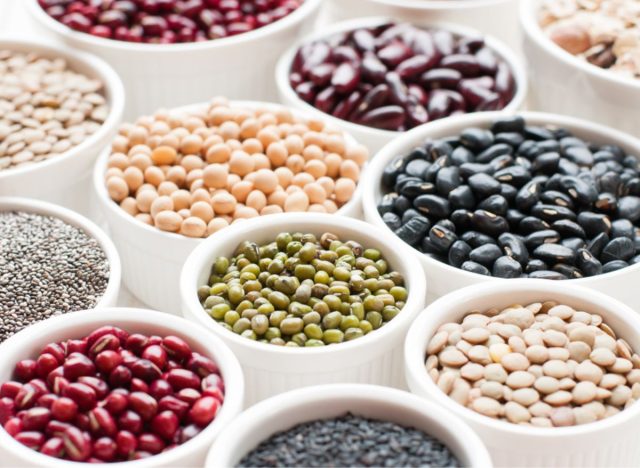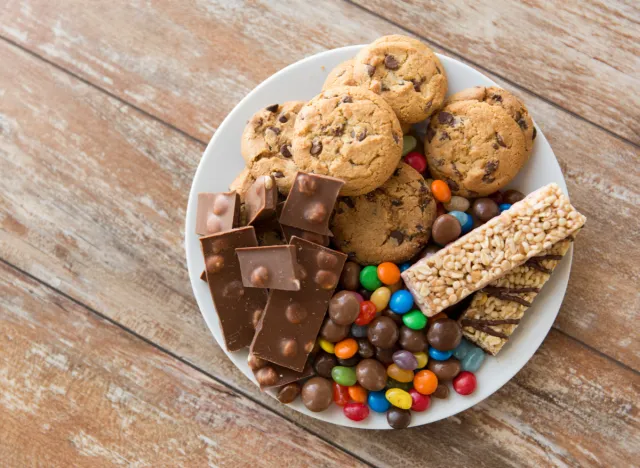Everyday Habits That Are Wrecking Your Body, Say Experts

Everyday habits can be tough to break, especially the ones revolving around food. For example, maybe you're someone who has a habit of eating a lot of sugar after meals, or maybe you've gotten into the habit of skipping breakfast because you have a routine of sleeping in and heading straight to work.
Whatever your habits may be, it's important to pay attention to the ones that may be harming your health in the long run. We talked with a few experts to learn about the everyday habits that can wreck your body so that we can know which ones to try to avoid.
Read on to learn more about these harmful habits, and for more healthy eating tips make sure to check out The 7 Healthiest Foods to Eat Right Now.
Skipping breakfast

According to our experts, skipping breakfast is one of the worst eating habits to have. "Eating in the morning sets your body up for a day of stable blood sugar, meaning you won't have as many intense cravings," says registered dietitian Lauren Pimentel, RD, "so when people skip breakfast, they often end up overeating throughout the day because their bodies are starving and desperate for nutrients."
Pimentel also notes that this can contribute to a vicious cycle, where "those who skip breakfast often end up eating their largest meal at night, and these individuals feel very full when going to sleep, and most likely wake up with little or no appetite for breakfast."
Too many juice cleanses

A juice cleanse here or there is probably fine, but Pimentel believes that continuously cleansing or going on fasts can wreck your body and your metabolism.
"If you continuously do fasts and cleanses, your body will slow down your metabolism over time as a protective measure, which is your body saying 'oh no, we are being starved again, we better hold on to these calories because we might not get more for a while,'" says Pimentel, "and a slower metabolism eventually leads to weight gain and makes it increasingly difficult to lose weight over time."
Eating late at night

According to our registered dietitian expert, Keith-Thomas Ayoob, EdD, RD, eating before bed is a detrimental habit that can lead to disrupted sleep, reflux and indigestion issues, and a lack of hunger in the morning.
"There's actually something called 'night-eating syndrome' where people eat very little during the day and think they're saving all these calories, only to have a huge calorie blast at night when they get hungry while watching TV," says Ayoob, "so to avoid this, try to avoid eating 3 hours before bedtime and eat a high-protein breakfast within two hours of waking up."
Ayoob says that getting enough calories and protein during the day and closing the refrigerator door in the evening before bed will lead to much better sleep and can potentially help with your weight goals as well.
Not eating enough beans

Beans get a bad rap as food that sometimes leads to unwanted gas, but they're are actually considered to be one of the healthiest foods you can eat.
"Beans hit that 'nutrition trifecta' by having protein, fiber, and a ton of vitamins and minerals," says Ayoob. "Beans also have a low glycemic index, which meas they don't spike your blood sugar like refined carbs do."
Ayoob suggests incorporating beans into your diet gradually but consistently, like adding a tablespoon or two to a soup or salad several days a week, to minimize flatulence.
Eating giant portions

Eating portions that are too large in one sitting may be wrecking your health without you realizing it.
"The excess calories may be deposited as fat in your body, leading to an increase in body weight," says Daniel Boyer, MD, "and extra weight makes you more likely to develop high blood pressure and high cholesterol levels, which are two risk factors of major health conditions like diabetes and heart diseases."
Too much added sugar

Eating too much added sugar is a habit that can lead to many health issues, and because it's so readily available in the food that we buy in stores and at restaurants, it can be easy to consume too much.
"Added sugar can lead to higher blood pressure, inflammation, weight gain, diabetes, and fatty liver diseases, which are all linked to heart attack and stroke," says Boyer.
Read these next:
- Weight Loss Habits Dietitians Want You to Try Right Now
- The Worst Eating Habits for Your Gut, Say Dietitians
- Health Habits Experts Warn You Should Avoid if You're Over 50








